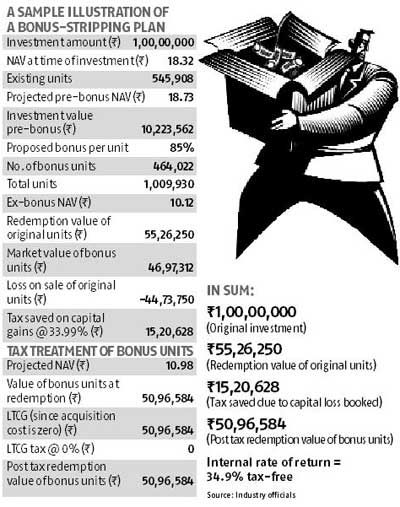 Following an increase in the tax on debt mutual funds, corporate and other wealthy investors have turned to arbitrage funds.
Following an increase in the tax on debt mutual funds, corporate and other wealthy investors have turned to arbitrage funds.
Those in the sector say since Budget 2014-15 announced a higher tax for debt mutual funds, about Rs 10,000 crore (Rs 100 billion) has made its way into arbitrage funds.
A single mid-sized fund house alone is said to have accounted for about Rs 5,000 crore (Rs 50 billion).
The ‘bonus-stripping’ feature in these schemes (buying a security ahead of a bonus and selling the original units to book short-term capital loss; the loss booked is offset against a short-term capital gain) is proving to be a big draw for investors, as it helps them save on taxes.
Those in the sector said about half the Rs 10,800 crore (Rs 108 billion) of inflows into equity schemes in July could have gone into arbitrage schemes.
And, these inflows were set to increase, they added.
Experts say at least 10 asset management companies (AMCs) are offering schemes with bonus-stripping features, adding assets under such schemes could worth about Rs 25,000 crore (Rs 250 billion). Some fund houses, however, aren’t offering such schemes due to concern they might come under the regulatory scanner.
“Bonus-stripping has become a way for AMCs to gather assets.
Technically, there is nothing illegal in this practice, according to current income tax guidelines, but at some point, income tax authorities may feel this is a way of avoiding tax,” said Niranjan Risbood, director (fund research), Morningstar India.
Such schemes try to exploit an anomaly in taxation, but aren’t in violation of laws, experts say.
Dhirendra Kumar, chief executive of Value Research, said there was nothing illegitimate about such schemes as long as the information on bonus announcement wasn’t leaked.
However, some say information on bonus declaration is leaked to select investors more than 90 days in advance.
According to the provisions of the Income Tax Act, if original units are acquired three months before the record date and bonus units are allotted based on the holding of original units, the losses (if any) on sale of the original units within nine months of the record date will be ignored in the computation of a unit holder’s taxable income.
Prior information on bonus announcement helps investors circumvent the restrictive rule against bonus-stripping by timing their investment and redemption date in the scheme.
Through this, investors make a killing, as original units are sold after the allotment of bonus units, which are sold after a year to save on capital gains tax.
For instance, an investment of Rs 100 on a ‘bonus-stripping’ plan with an assumed bonus of 85 per cent and returns of 8.5 per cent will result in a gain of at least Rs 20, which is tax-free for a typical holding period of 15 months.
On a tax-adjusted basis, the returns could be as high as 35 per cent. “Bonus-stripping provides a tactical way of reducing tax payouts.
More, since fund houses offer this strategy within the regulatory framework, it turns out to be a win-win situation for both AMCs and investors,” said an expert.
Many say to save such schemes from the regulatory axe, fund houses should avoid divulging bonus information to investors.













 © 2025
© 2025